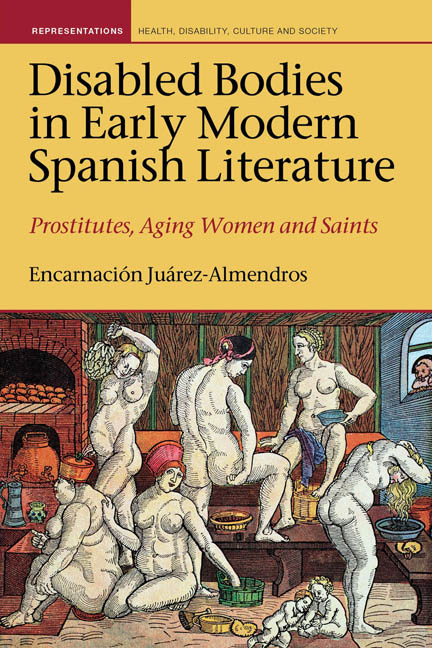Book contents
- Frontmatter
- Contents
- Acknowledgments
- Introduction
- I The Creation of Female Disability: Medical, Prescriptive and Moral Discourses
- II The Artifice of Syphilitic and Damaged Female Bodies in Literature
- III The Disabling of Aging Female Bodies: Midwives, Procuresses, Witches and the Monstrous Mother
- IV Historical Testimony of Female Disability: The Neurological Impairment of Teresa de Ávila
- Conclusion
- Works Cited
- Index
III - The Disabling of Aging Female Bodies: Midwives, Procuresses, Witches and the Monstrous Mother
- Frontmatter
- Contents
- Acknowledgments
- Introduction
- I The Creation of Female Disability: Medical, Prescriptive and Moral Discourses
- II The Artifice of Syphilitic and Damaged Female Bodies in Literature
- III The Disabling of Aging Female Bodies: Midwives, Procuresses, Witches and the Monstrous Mother
- IV Historical Testimony of Female Disability: The Neurological Impairment of Teresa de Ávila
- Conclusion
- Works Cited
- Index
Summary
In chapter II I examined the effects of syphilis in the representation of loose women as a particular group of symbolic disability. In the spectrum of pejorative literary female figures this chapter concentrates on the analysis of older women. While syphilis is the master metaphor that informs the construction of the diseased-contaminant younger prostitute, the concepts of inefficiency, destruction, wickedness and death imbued older women. Old women are presented as corrupted social agents that harm both the individual body and the body politic with their distorted knowledge and evil powers. Physical impairments, ugliness and dangerous immorality characterize these figures.
The works chosen for examination in this chapter, Fernando de Rojas’ La Celestina (1499, 1502), Cervantes's Diálogo de los perros [Dialogue of the Dogs] (1613), Mateo Alemán's Guzmán de Alfarache (1599, 1604) and Francisco de Quevedo's El Buscón [The Swindler] (1626), as well as his satiric poetry, are representative of the evolution of elderly women characters in early modern Spanish literature. Using disability and aging theories, I focus the analysis on the major components of their depiction: their defective bodies, their relation to the healing arts and sexual activities, their proclivity to practice witchcraft and their inefficient role as mothers. The objective is to illustrate the mechanisms involved in the construction of female disability in the imaginary of the period. The impaired elderly figurations are not only products of ideological and historical circumstances—so having no function in the hierarchical abled male system—but also reflect the social anxieties surrounding and the visceral rejection of a group of human beings that embodied the collapse of life.
A number of theories of aging and feminist disability have argued that ageism and ableism derive from a similar system of oppression and suggest that factors such as aging augment the negative social perception of women. These systems transform ordinary human physical outcomes, such as impairments, ailments and corporeal conditions due to old age, into a social problem, subordination and shame. The aged, like the disabled, provoke the same reaction on the part of mainstream society of repulsion, alienation and invisibility, and are commonly considered less intelligent and useless.
- Type
- Chapter
- Information
- Disabled Bodies in Early Modern Spanish LiteratureProstitutes, Aging Women and Saints, pp. 83 - 115Publisher: Liverpool University PressPrint publication year: 2017

